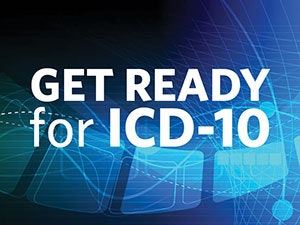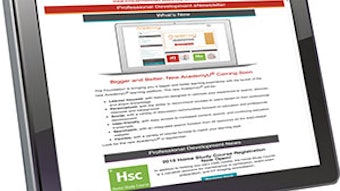Get ready for ICD-10
In July, the Centers for Medicare & Medicaid Services (CMS) announced efforts to limit the burden on providers for the ICD-10 transition slated for October 1. What are the effects on the average otolaryngology practice, and should you alter your own “go-live” plan?
 Robert R. Lorenz, MD, MBA
Robert R. Lorenz, MD, MBABy Robert R. Lorenz, MD, MBA, coordinator for Practice Affairs and Physician Payment Policy (3P) Workgroup co-chair
In July, the Centers for Medicare & Medicaid Services (CMS) announced efforts to limit the burden on providers for the ICD-10 transition slated for October 1. What are the effects on the average otolaryngology practice, and should you alter your own “go-live” plan?
This course alteration by CMS was done to make the effort less burdensome on smaller practices having to deal with the cost of the ICD-10 transition. Denials for coding inaccuracies will be suspended for 12 months for Part B Medicare claims, as long as the physician uses a “valid code from the right family.”

Setting up an ombudsman to “help receive and triage physician and provider issues” is a positive step, but the ease of use and effectiveness of this service is to be determined. And clearly, the last two changes—lack of PQRS, VPM, and MU penalties due to the additional specificity of ICD-10 codes and assurance of payment in the case of contractor system malfunction or implementation problems through an advance payment option—are good signs. This also suggests that CMS realizes that “things can go wrong” (think Healthcare.gov), and the provider community will not be at as much risk from the government’s deficits, especially in respect to maintenance of cash flow.
In summary, the CMS announcement doesn’t relieve your need to go live with ICD-10 on October 1. It may make the transition a bit more palatable, but I’d strongly recommend you prepare for the October 1 date and don’t take too much solace from CMS’s recent announcement.
See FAQs about the CMS efforts at www.cms.gov/medicare/coding/icd10/downloads/icd-10-guidance.pdf. Read more about the transition at www.cms.gov/Newsroom/MediaReleaseDatabase/Press-releases/2015-Press-releases-items/2015-07-06.html.
*Dr. Lorenz is primarily responsible for private payer issues, including coverage, coding, and payment policies. He also provides oversight on the development and maintenance of programs that support the services our physicians provide to patients, including the Academy’s Position Statements, Clinical Indicators, and ICD-10 educational efforts.
**Please note: These superbills are designed solely as an exercise in demonstrating the process of transitioning to the new ICD-10-CM coding system. They do not represent an endorsement by the Academy of the use of superbills or either particular superbill format.











